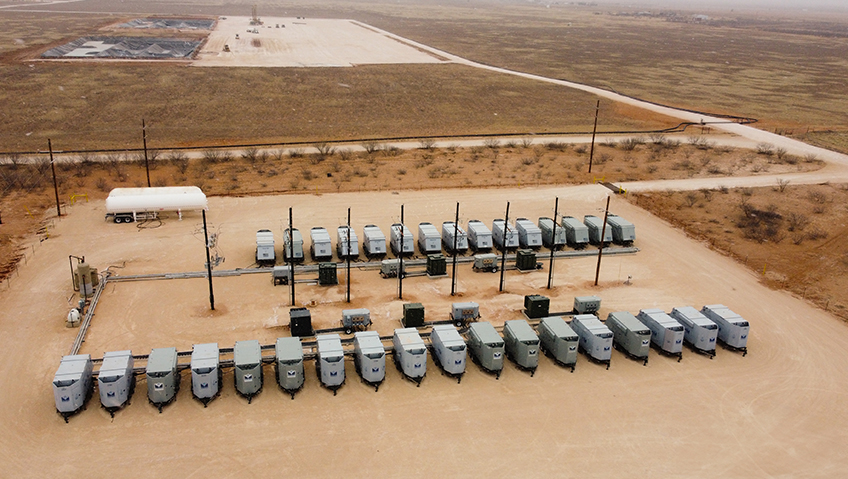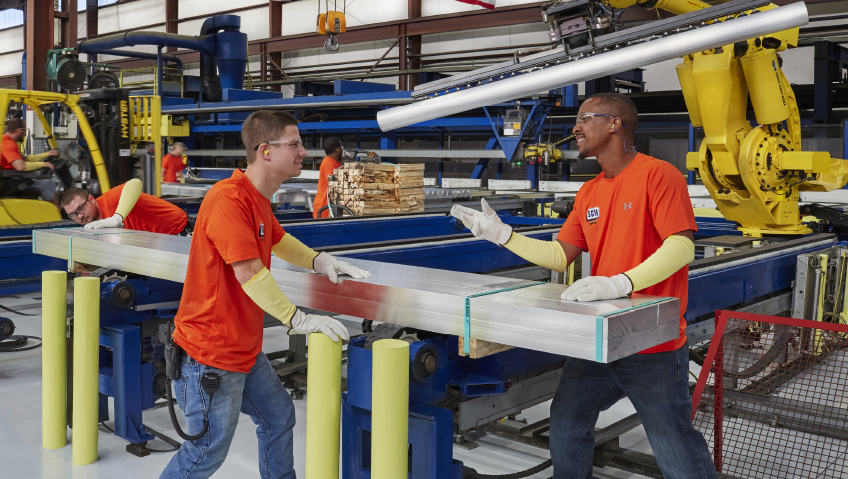There have been enormous changes at Mesa Solutions since this Loveland, Colorado-based company was profiled in April 2021 in Resource in Focus. Mesa specializes in the design, manufacture, installation, and maintenance of portable and stationary generators used to produce electricity, and since our previous profile, has introduced new products, forged new partnerships, adopted a new approach to business, and has new owners. Over the past three years, Mesa’s workforce has soared from approximately 300 employees to roughly 1,000 today.
This explosive growth “is not really magical. It’s just the fact, since we manufacture, lease, and maintain our own equipment, we know how to make it work reliably,” explains Tom Poteet, Senior Vice President of Corporate Development at Mesa.
Last year, the company opened a new manufacturing and assembly facility in San Antonio, Texas and plans to open a new multi-use plant in Wyoming. Slated to be 220,000 square feet in size, the Wyoming plant will complement existing Mesa manufacturing facilities in the state. In January 2025, the firm held a groundbreaking ceremony in Evansville, Wyoming to mark the beginning of construction.
For all this, Poteet points to the introduction of a new line of powerful generator engines as the single biggest change in recent years. Mesa’s new GV22PU, GX22, GX15, and GX12 engines were created through a partnership with Hyundai Infracore (HDI). The GX engines, meanwhile, were built with four-valve cylinder heads “for higher power ratings in the same package,” explains Mesa literature.
These HDI engines sport a new throttle, updated knock-sensor calibration, modified intake design, and other features for enhanced performance. The GV22PU engine block received Environmental Protection Agency (EPA) emissions standards certification—further evidence of Mesa’s eco-friendly ethos. Mesa’s generators are fueled either by propane or natural gas (one of the cleaner burning fossil fuels).
By utilizing the new HDI engines, “we’re able to offer a higher power output for our generators,” adds Poteet.
In addition to becoming an authorized HDI engine distributor, Mesa has formed a collaboration with Modern Hydrogen to provide on-site clean power to data centers and the like. Modern Hydrogen is a prominent energy and materials company with a proprietary methane pyrolysis technology that can transform natural gas into hydrogen. This process also produces solid carbon that can be used in asphalt for road-strengthening purposes.
The partnership was officially forged by the respective company CEOs at a POWERGEN International Conference in Houston back in February. Under the terms of the collaboration, Mesa will develop a 100 percent hydrogen-powered generator while Modern Hydrogen develops an onsite natural-gas-to-hydrogen solution.
Once completed, this hydrogen-fueled power generation system “might fit in the smaller data center market—smaller meaning five to 10 megawatts,” Poteet explains. “There are a lot of edge data centers out there that fall into that size range.”
Mesa continues to offer two flagship products: the stationary PowerCore generator and its counterpart, the Portable Natural Gas Generator. Rugged and reliable, these generators can run 24/7 and withstand temperature extremes of hot and cold. Since we last spoke, Mesa has made some tweaks to these generators “which may not be obvious to our customers” but are intended to improve overall workability, reliability, and manufacturability, says Poteet.
In addition, the company is currently developing a brand-new product line called PowerYard, which consists of “several basic units” placed together in the same enclosure. While PowerYard hasn’t been released yet, the system might be a good fit for data centers, Poteet suggests, and the team is excited about the new product launch.
Amid all these developments, ownership of the company has changed hands. Founded in early 2014, Mesa was originally owned by BP Energy Partners of Dallas (itself spun off from the BP Capital Management hedge fund). In mid-2023, BP Energy Partners sold the firm to Arroyo Investors, an independent investment manager based in Houston, Texas. Mesa’s mandate hasn’t changed, however, and the company remains devoted to its core product line alongside new innovations and offerings.
Of course, quality continues to be paramount at Mesa, and last year, the company achieved ISO/IEC 27001:2022 certification, a standard covering information security management. The ISO certification serves as a sign of how seriously Mesa takes the protection of client and company information. While there is no shortage of other firms that also build and/or supply generators, Mesa also sends out teams to deploy and maintain its products. This inclusive approach gives Mesa more control over its product line and the quality assurance process.
“We have the best quality conversation loop between assembly and field operations that I’ve ever seen in my career… Any time the folks in the field identify a problem or potential problem, they can immediately talk to the designers and the assembly people, or vice-versa,” notes Poteet with pride.
Quality is also ensured through telematics technology, which enables operators to remotely monitor generator performance in the field.
In addition to new products, Mesa is also exploring new ways of doing business. Instead of “just doing month-to-month rental leases” more and more customers are “looking at multi-year leases. Because there’s so much demand for our products, and so much demand for natural gas generators in general, people are realizing they need to lock up some capacity. So, they’re coming to us a bit earlier than they used to and are making longer deals. That’s good for them and for us.”
While Mesa once focused primarily on rentals, “we’re selling completed units now, and we’re doing longer and longer contracts… the deals are getting bigger and more complex,” he adds.
Main markets for the company still include oil & gas, mining, construction, and commercial/industrial. The oil & gas sector still brings in the most revenue, although the team is eager to expand its reach with data centers and utilities.
Data centers feature banks of computers and ancillary equipment, and require a consistent source of power to keep downtime to a minimum. Mesa, which can link its generators together in microgrids for boosted power and reliability, is more than capable of meeting this challenge, says Poteet. “By building out our generators [by the hundreds], if any one unit went down it wouldn’t even be noticed. All the others would incrementally pick up the load,” he notes.
Utility companies responsible for providing electricity also value this reliability and efficiency, and thus have become increasingly interested in Mesa’s offerings. “We have several conversations going on that involve utilities that might want to put in 10 MW of generators alongside a 10 or 15 MW substation so they have [a backup source] for peak power, but also in case the substation becomes isolated as far as the transmission network goes. If the substation is isolated and they have generators that are standing by, they can still feed all their distribution circuits,” explains Poteet.
As it always has, Mesa employs a large number of former military personnel. Several of the founders came from military backgrounds and Mesa was won several HIRE Vets Medallion Awards from the U.S. Department of Labor in recognition of its work with veterans. This pro-veteran stance has been key to Mesa’s success, says Poteet.
“A lot of our leadership are former military, and they know how to find the right people with the right experience to match up with our jobs… We have really focused a lot on ethics and character. We hire people based on character. If we find a person with good character, we can train them to do just about any job.”
In turn, Mesa treats its workforce well. Employees and their families receive 100 percent healthcare premium coverage (for vision, dental, and medical care), 401(k) matching programs, holiday pay, and life and disability insurance options.
When it comes to promotion, “we haven’t done what I would call a nationwide advertising blitz, but our marketing effort has multiplied greatly in recent months,” Poteet tells us. The team regularly attends trade shows (Poteet did his interview while attending the Microgrid Knowledge 2025 Conference in Dallas and sits on the advisory board for that group) and the company is beefing up its online presence as well.
Mesa Solutions continues to work with some overseas clients in addition to American customers. The team is involved in several projects at present, directly or through partners, in Canada, Mexico, Colombia, and Australia, says Poteet, all a part of its growth plan. Five years from now, “we’d like for every piece of the pie to be an order of magnitude bigger,” he says. “We also really want to get more into the data center world and the commercial and industrial sectors—either as a prime power [source] or standby—and also the utility world.”
He expects the company’s upwards trajectory in employment will continue. “There are a lot of things that drive that. Society is trying to be even more electrified, and they want the electricity to be ever more reliable. The demand for reliable, standby power is going to continue to increase.”






